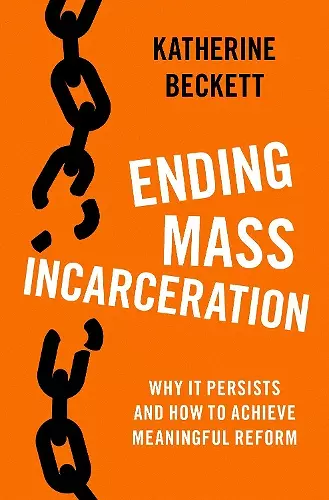Ending Mass Incarceration
Why it Persists and How to Achieve Meaningful Reform
Format:Hardback
Publisher:Oxford University Press Inc
Published:3rd May '22
Currently unavailable, and unfortunately no date known when it will be back

Why mass incarceration endures in the face of reforms, and how to truly change America's vast criminal justice system Critics on both the left and the right increasingly use the term "mass incarceration" to call attention to the unprecedented scale and inequities of the U.S. criminal legal system, and the havoc it wreaks. But even as lawmakers begin to embrace criminal justice reform, the criminal legal response to crime is harsher than ever. In this book, Katherine Beckett explains how and why mass incarceration persists despite growing recognition of its many failures, plummeting crime rates, and widespread efforts by state legislators and others to reduce prison populations. Beckett identifies three primary forces sustaining incarceration rates in this country: political dynamics around violence, resistance to criminal legal system reform in suburban and rural counties, and the failure of popular drug policy reforms to reduce the reach of the criminal legal system. Most reform efforts to date have limited themselves in ways that are politically palatable but do little to curb key drivers of mass incarceration. Beckett then turns to the question of how we can meaningfully decrease the size of the criminal justice system when so many reforms have failed. Drawing on extensive research, she argues for political and policy shifts that would significantly reduce the scale of punishment while also addressing the underlying social problems to which those extreme penalties are a misguided response. We need to end excessive sentencing and tackle the myth of monstrosity that fuels these inhumane sentences. We need to expand restorative justice principles that offer alternative ways of promoting accountability and healing. We need to expand harm-reduction and community-based responses for less serious crimes such as drug law violations. And in a broader sense, we need to reimagine our view of public safety and understand that locking up millions of our fellow citizens does not make us safer. Rather than focusing on one key change as a miracle cure for our criminal justice system, Ending Mass Incarceration provides a cogent analysis of the dynamics working to sustain mass incarceration, the reforms that have been attempted to date, and the reforms we need to bring about truly transformative change.
This is the right book at the right time by the right author. Katherine Beckett has a keen understanding of the dynamics of criminal justice reform - both its strengths and weaknesses - as well as a sharp sense of what is necessary to correct misguided approaches in order to truly challenge mass incarceration. While policymakers and advocacy organizations both on the left and the right are congratulating themselves for the changing political environment on mass incarceration, Beckett carefully identifies the weaknesses and limitations of current reforms. Her analysis is very much on target. * Marc Mauer, Senior Advisor to The Sentencing Project and co-author of The Meaning of Life: The Case for Abolishing Life Sentences *
Ending Mass Incarceration makes a timely and important contribution to research and policy debate about the the future of criminal justice policy in America. Katherine Beckett grounds current debates firmly in research helping us to understand how we can expand our possibilities and reverse the scourge of mass incarceration. * Bruce Western, Chair, Department of Sociology, Columbia University *
This book is simply terrific! Professor Beckett has written a deeply informed, realistic yet hopeful, and erudite yet accessible book. Its publication could not be more timely as the nation struggles with whether genuine criminal justice system reform is possible, what steps need to be taken to bring it about, and what meaningful change would really look like. Beckett makes invaluable contributions to all of these overarching questions. * Craig Haney, Distinguished Professor of Psychology, University of California, Santa Cruz *
This is a well-organized run-through of the human costs involved in the scourge of mass incarceration. It is logical and consistent and, given the overwhelming evidence, represents a consensus among the overwhelming majority of contemporary scholars...Recommended. General readers through faculty; professionals. * Choice *
ISBN: 9780197536575
Dimensions: 221mm x 157mm x 31mm
Weight: 499g
272 pages